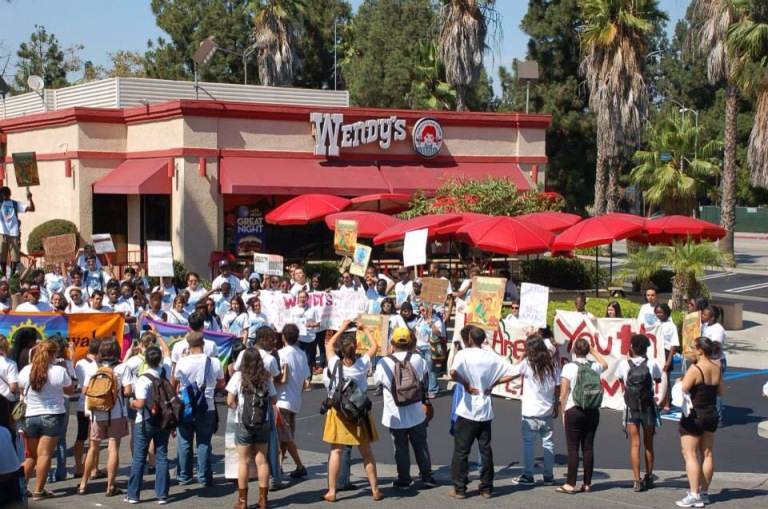
Hello loyal readers. Happy Wednesday 🙂 Here is another insightful post about an issue that affects us all.
Ok have you ever heard for a farmworker? No well there are about 3 million of them throughout the United States today. They are the back bone of the American agriculture system yet they are treated as modern day slaves. Farmworkers are people who work in the agriculture system on farms and can be seasonal (migrant) or permanent. The migrant or workers who move from place to place, are the low-wage workers. Most Farmworkers are not United States citizens coming from places like Asia, Africa and South America who mostly are in this country illegally and due to that can not get a job so they are forced to become Farmworkers as they can work without status. Now you might be thinking that hey that sounds like a plus these people get to work in this country without being thrown out but sadly its not.
Since the beginning of the colonization in this country there have been some type of slavery or free labor. From the Native Americans to the Trans Atlantic Slave Trade to Farmworkers there have always been a group of people who have been on the bottom to do the most degrading and mediocre jobs for little or no pay at all. All the while being mistreated or becoming sick and dying from diseases or pesticides, brutality of the “slave master”, sexual harassment/rape, long hours and environmental ailments among other issues.
For Farmworkers since they are in this country illegally the farm managers treat them like they are not people. A lot of times these people will leave their county due to war or poverty and try to start over in America bringing over their families. It’s a very sad unfortunate thing for them as they are not paid enough to feed their families and they have to live in cramped corners with other families in trailers. They also have to wake up at 3-4 in the morning just to catch a bus which them an hour away from their home to the fields and won’t come home till around 9-10 at night working 18 hour days. And most people in this country complain about working 5 hour days
Anyway this weekend in St. Petersburg, Florida the Farmworker advocacy organization the Coalition of Immokalee Workers is having a parade and concert to raise money for the organization. It will be on Saturday and I am going down to support with the DC Fair Food group and the Student Farmworker Alliance.
We are DC’s local Fair Food Group – students, youth, people of faith and community members organizing in solidarity with the Coalition of Immokalee Workers to strengthen the Fair Food Program and build a Fair Food Nation.
The Coalition of Immokalee Workers is a farmworker organization fighting for better wages and working conditions in Florida’s fields since 1993.
With the support of ally groups like DC Fair Food, the CIW is changing the face of agriculture and building a more just and sustainable food system!

Student Farmworker Alliance (SFA) is a decentralized network of diverse organizations and individuals whose actions are unified by the following principles:
I. We work with – not for – farmworkers.
Only farmworkers can speak for themselves. SFA is dedicated to working with farmworkers for change but we will not act on their behalf, instead taking our lead from the workers themselves. Farmworkers’ daily experience of working in sweatshop conditions in the fields puts them in the best position to build movements to change those conditions—and the larger power imbalances they stem from. In turn, we take responsibility for organizing our communities to understand—and act on—our role in this movement.
Our struggles are not the same but they converge. Both farmworkers and young consumers are objectified by the corporate food industry: farmworkers are seen as tractors that harvest raw materials cheaply while youth are seen as mouths that obediently consume branded, unsustainable products. In an increasingly polarized global economy—where the growing concentration of wealth and corporate power threatens nearly everyone—it is imperative that we unite in common struggles and create meaningful solidarity with one another.
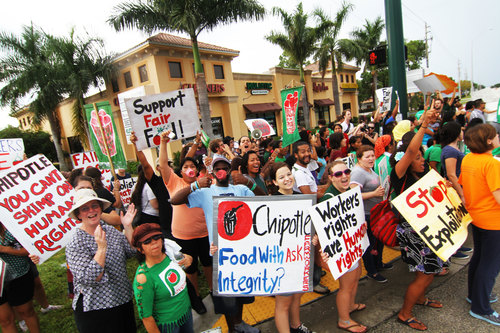

II. We have a powerful voice in working with farmworkers for systemic change
Young people have a powerful voice in our communities. Historically, we have been creative and forceful catalysts for change, and today young people are at the forefront of movements throughout the world confronting injustice.
Students have a powerful voice on our campuses and can hold our educational institutions accountable for who they chose to do business with. In the words of students at the National Autonomous University of Mexico (UNAM), who waged a 9-month campus-wide strike in 1999: “The University belongs to those who study in it!”
Consumers have a powerful voice with corporations that profit from worker exploitation. With this awareness, we can pierce the veil of branding and multi-billion dollar advertising budgets, disrupting business as usual for unethical corporations.
III. We organize to build long-term movements for collective liberation
As a network comprised of people with diverse backgrounds and experiences, we strive to keep a focus on collective liberation at the forefront of our work so that we do not reproduce patterns of oppression. We believe that organizing according to these principles is essential to building truly democratic and effective social movements that can win systemic changes while prefiguring the type of world we want.
Now what does the Coalition of Immokalee Workers do? The actually have different things that they do that are all interrelated like the Fair Food Campaign, Fair Food Program and Anti-Slavery Campaign.
The Coalition of Immokalee Workers (CIW) is a worker-based human rights organization internationally recognized for its achievements in the fields of social responsibility, human trafficking, and gender-based violence at work. Built on a foundation of farmworker community organizing starting in 1993, and reinforced with the creation of a national consumer network since 2000, CIW’s work has steadily grown over more than twenty years to encompass three broad and overlapping spheres:
The Fair Food Program
In 2011, CIW launched the Fair Food Program (FFP), a groundbreaking model for Worker-driven Social Responsibility (WSR) based on a unique partnership among farmworkers, Florida tomato growers, and participating retail buyers, including Subway, Whole Foods, and Walmart. Under the FFP:
 CIW conducts worker-to-worker education sessions, held on-the-farm and on-the-clock, on the new labor standards set forth in the program’s Fair Food Code of Conduct;
CIW conducts worker-to-worker education sessions, held on-the-farm and on-the-clock, on the new labor standards set forth in the program’s Fair Food Code of Conduct; - The Fair Food Standards Council, a third-party monitor created to ensure compliance with the FFP, conducts regular audits and carries out ongoing complaint investigation and resolution; and
- Participating buyers pay a small Fair Food premium which tomato growers pass on to workers as a line-item bonus on their regular paychecks (Between January 2011 and October 2014, $15 million in Fair Food premiums were paid into the Program).
The FFP standards are enforced through market consequences guaranteed by CIW’s legally binding Fair Food Agreements, in which participating buyers commit to buy Florida tomatoes only from growers in good standing with the FFP, and to cease purchases from growers who have failed to comply with the code of conduct. The United Nations Working Group on Business and Human Rights has described the FFP model as “smart mix of tools” that “could serve as a model elsewhere in the world.”

The Fair Food Program truly represents a win-win-win for workers, growers, and retailers:
- Workers receive protection of their human rights in the workplace and increased wages;
- Growers gain an effective risk management system, a more stable workforce and a means to distinguish their product in an increasingly competitive marketplace; and
- Retailers receive a system that protects their brands from the reputational risks of supply chain labor abuses by eliminating those abuses, not papering them over, a far more effective means to protect their interests than the traditional model of corporate social responsibility.
Recognition for the Fair Food Program is growing quickly. In 2014, CIW received the Clinton Global Citizen Award for the groundbreaking impact of the Fair Food Program. CIW has also received the Roosevelt Institute Freedom From Want Medal in 2013 and the Natural Resources Defense Council’s Growing Green Award in 2012.
Anti-Slavery Campaign

CIW’s Anti-Slavery Campaign has uncovered, investigated, and assisted in the prosecution of numerous multi-state farm slavery operations across the Southeastern U.S., helping liberate over 1,200 workers held against their will since the early 1990’s. CIW also pioneered the worker-centered approach to slavery prosecution, played a key role in the passage of the 2000 Trafficking Victims Protection Act, and co-founded the national Freedom Network USA and the Freedom Network Training Institute, which is regularly attended by local, state and federal law enforcement officials. The CIW is a partner in The Alliance to End Slavery and Trafficking (ATEST), advocating for solutions to prevent and end all forms of human trafficking and modern slavery around the world. Secretary of State Hillary Clinton recognized the CIW in 2010 with the Trafficking in Persons Hero Award, for the CIW’s “determination to eliminate forced labor in supply chains.”
With the implementation of the Fair Food Program, CIW has achieved the ultimate goal of all anti-slavery efforts, that of prevention. To avoid the market consequences built into the FFP, including strict zero tolerance for forced labor, participating growers actively police their own operations, and the worker-to-worker education program at the heart of the FFP informs and empowers tens of thousands of workers to serve as real-time monitors to identify and expose perpetrators if any slavery operations were to arise.
Today CIW’s Fair Food Program is about to expand to fields outside of Florida and to crops beyond tomatoes. CIW’s Worker-driven Social Responsibility model is being emulated and adapted to fight worker exploitation in settings as diverse as dairy farms in Vermont, tomato fields in Morocco, and apparel sweatshops in Bangladesh. The already stunning success of CIW’s model is now poised to serve as the foundation for even greater progress for low-wage workers, suppliers and corporate buyers in the years ahead.
The Campaign for Fair Food
CIW’s national Campaign for Fair Food educates consumers on the issue of farm labor exploitation – its causes and solutions – and forges alliances between farmworkers and consumers that enlist the market power of major corporate buyers to help end that exploitation. Since 2001, the campaign has combined creative, on-the-ground actions with cutting edge online organizing to win Fair Food Agreements with twelve multi-billion dollar food retailers, including Walmart, McDonald’s, Subway, Sodexo and Whole Foods, establishing more humane farm labor standards and fairer wages for farmworkers.
On Saturday, March 21st, farmworkers will gather with thousands of allies from across the U.S. for the first-ever Concert for Fair Food, harnessing the power of music to spark the consciousness of consumers and amplify the call for Publix and Wendy’s to finally recognize their responsibility to the people who harvest their produce. Featuring Grammy-winning and nationally-recognized artists, the Concert will raise the Campaign for Fair Food’s message to new heights.
While I was at different Rooted In Community (national youth food justice leadership organization) summits we have had people from the CIW and Student Farmworker Alliance come down and help us with our annual march for food justice. During my first RIC summit in Iowa, I was apart of a protest at Chipotle where we delivered a letter to their manager to give to corporate (before they signed the Fair Food Agreement) then for the last two summits in LA & ABQ, New Mexico we helped do the same at Wendy’s who sadly has not signed the Fair Food Agreement yet. This weekend we will be doing the same with a more local food chain called Publix as well as Wendy’s.
So hears some information on Farmworkers & this weekend. I will be twitting and posting on my facebook through out the weekend with pictures, videos and other media so be sure to check there. I will also try to get a blog post out about how it went either during the weekend or when I return. Oh PS a good video which you can watch on Netflix is Food Chains which talks all about the world of Farmworkers. Its a very insightful documentary go watch it!
Ok well I will leave you with some videos and pictures to help you understand this issue a little bit more.
Alright till I write again take care and fight for justice!
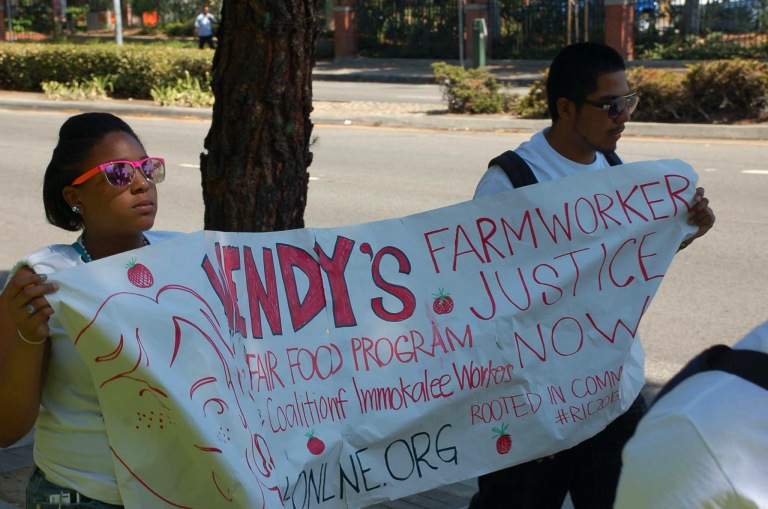


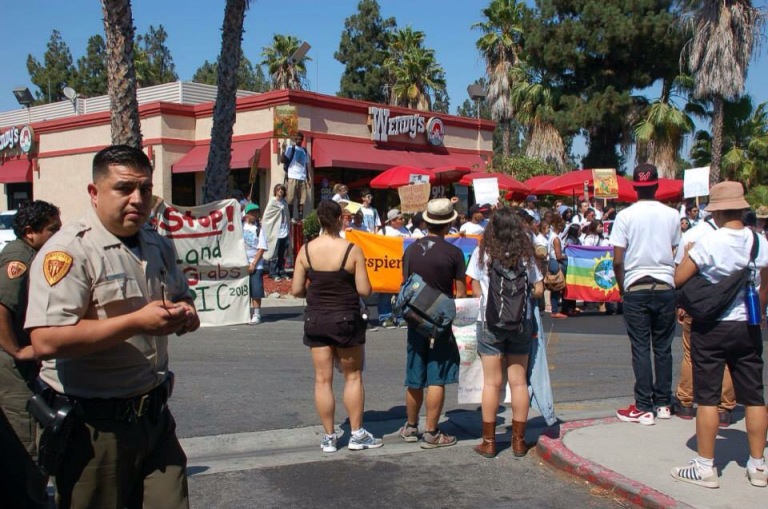

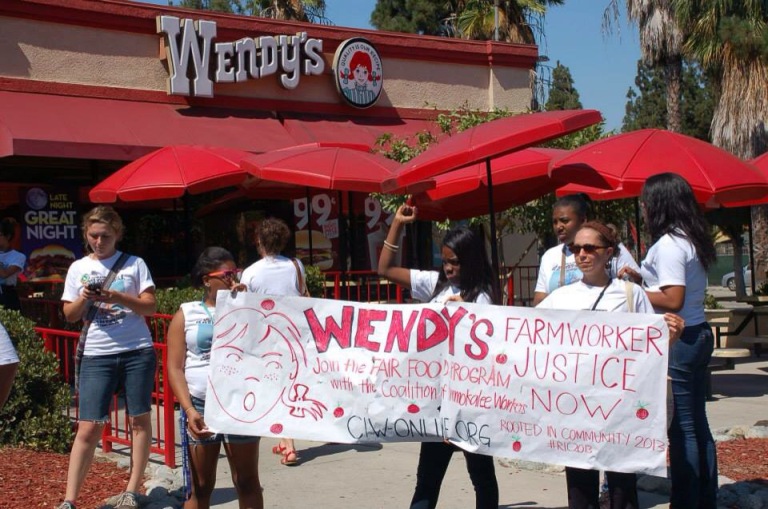
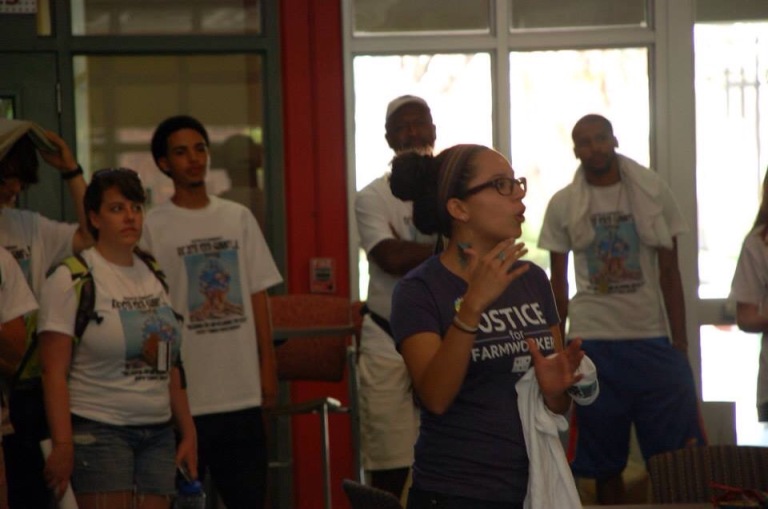
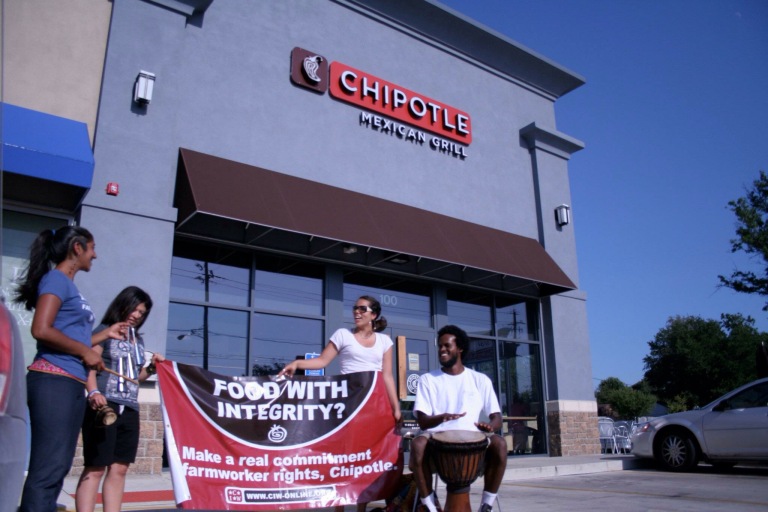
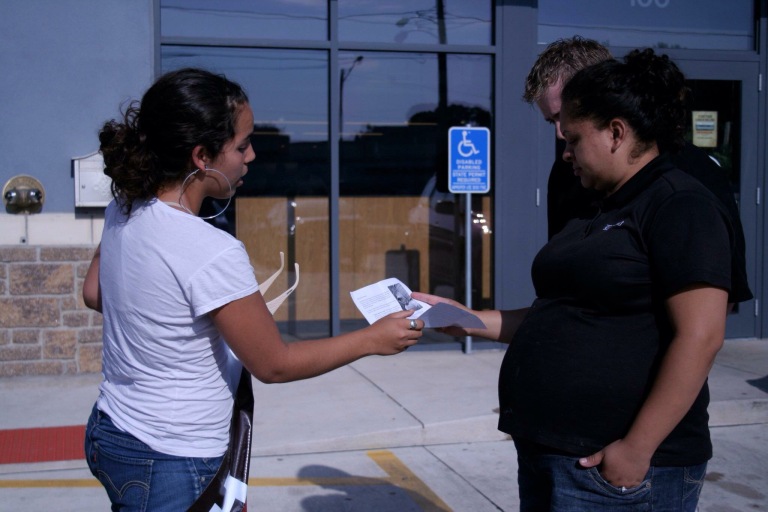
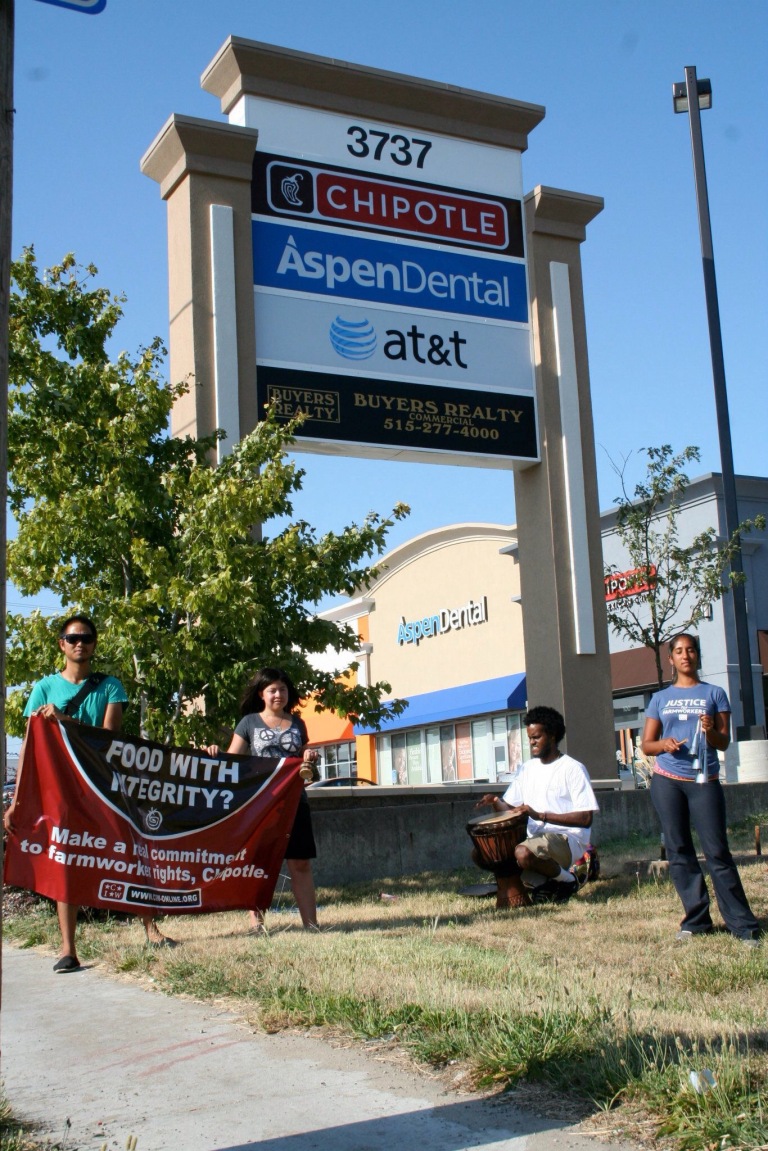
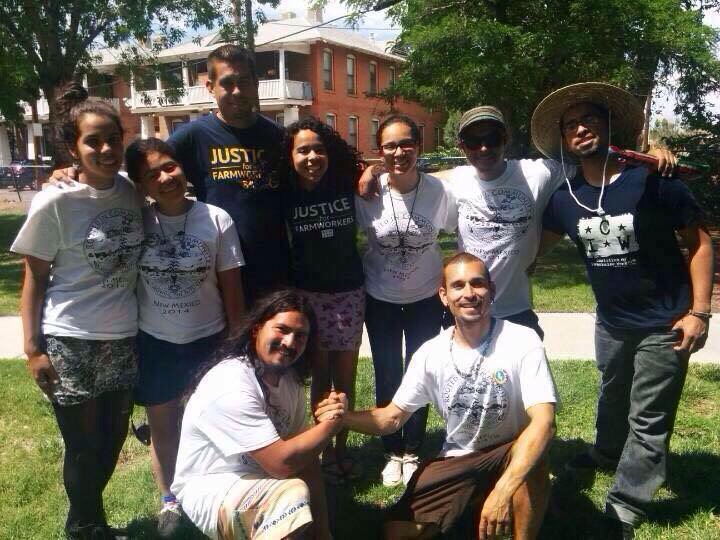

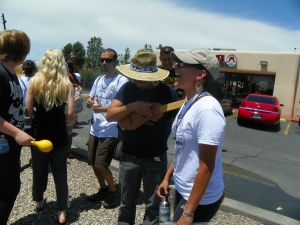
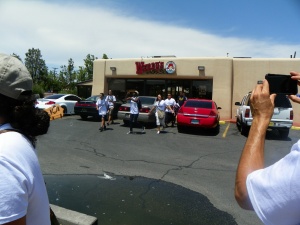
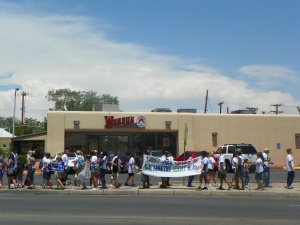
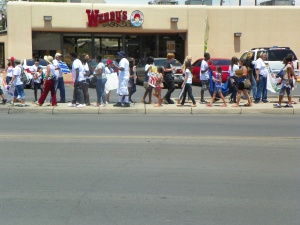
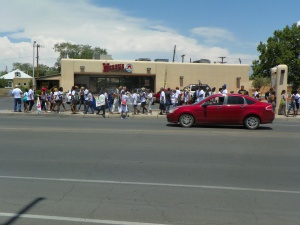
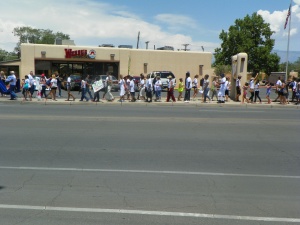
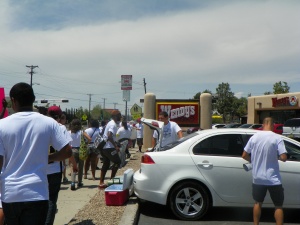
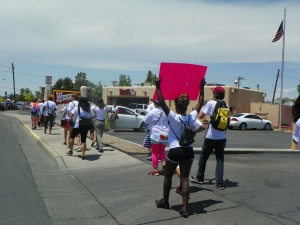
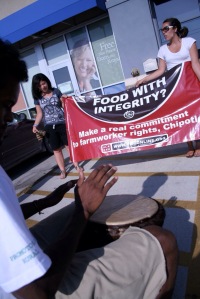
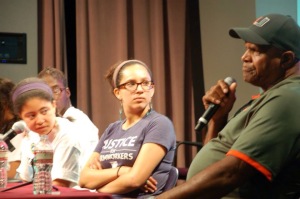
I enjoyed your blog post on #FairFoodNation very much.